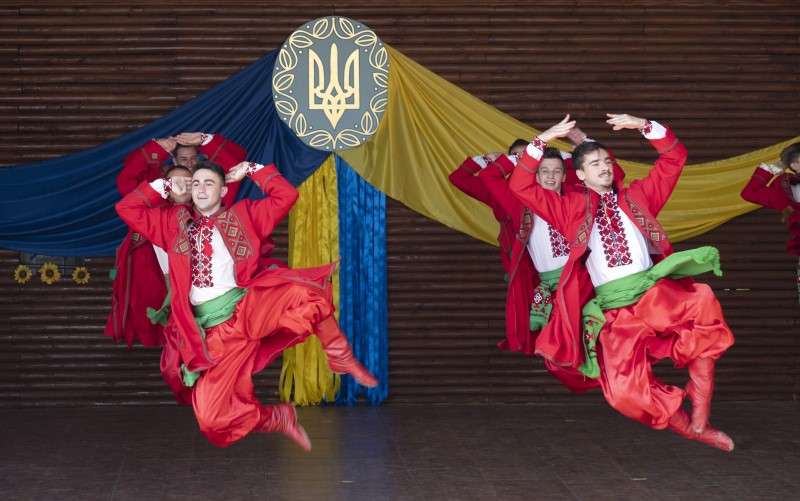D.C.’s Ukrainians celebrate heritage amid grief over Russian war

Traditional Ukrainian dancers performing at the Annual Ukrainian Festival held at the Saint Andrew Ukrainian Orthodox Cathedral in Silver Spring, Md., on Sept. 18, 2022.
11:34 JST, September 19, 2022
As glow sticks spun in the night sky, the dance-pop singer told an audience of thousands to look at the stars – and remember all the young men who will never see them again.
Seven months after Russia invaded Ukraine, the three-day festival that St. Andrew Ukrainian Orthodox Cathedral has held for the past 19 years is no longer a celebration of an obscure culture, but a consolation for a people infamously besieged. Ruslana, a Eurovision winner and former member of the Ukrainian parliament who performed at the festival, was not the only one balancing happiness and despair.
“Everyone is tired from depression,” said violinist Vasyl Popadiuk, another performer at the festival in Silver Spring, Md. “We need a little break. After, we will have more power for fighting.”
His mother and brother are still in Kyiv, and his bandmates there have “traded their instruments for weapons … it will never be like before.”
The traditional shirts called vyshyvanka that were lined up for sale outside the church came labeled by regions now better known for battles than embroidery: Chernihiv, Donetsk, Luhansk. Pointedly, there was a shirt for the Autonomous Republic of Crimea, which has been occupied by Russia since 2014.
Along with handicrafts for sale at the festival, there was a shipping container of medical supplies to be sent to the front. After weekly services, there’s now a line to light candles for the dead, said Tamara Woroby, president of the parish council. Father Volodymyr Steliac said that about 20 percent of parishioners are now refugees.
But as in years past at the festival, kids lined up excitedly to recite poetry in stumbling Ukrainian and dance in bright red leather boots, velvet red vests and flower crowns of pink and blue, gold and green.
“You want to see the soul of a nation, look at the colors,” said Steliac, who dreamed up this festival two decades ago. “Look at the clothing, look at the dance. You see beauty. Anything that interferes and tries to take from them, they will resist.”
Some of those helping run the festival expected to be in Ukraine. Natallia Korolchuk and Mykolenko Yaroslava met while folding some of the 15,000 varenyky dumplings for sale. Korolchuk, 55, made a mean joke, which reminded Yaroslava, 32, of her mother. On Friday night, they were at the church until 11 p.m. slicing pliatsok and honey cake.
Korolchuk was visiting her son in D.C. when the war began. Now she doesn’t know when she might return. Yaroslava was home in Cherkasy, but planning to go back to Maryland in March for work. Instead, her mother came to the door in tears on the morning of Feb. 24.
“It’s war,” she said.
Yaroslava wanted to stay. But “my parents pushed me,” she said. With help from strangers, she made her way to the United States through Poland, hiding from rockets while she waited for transport across the border.
Their hearts beat faster when they hear Ukrainian music and see people waving their flags. There is some comfort in no longer being confused for Russians. (Now, Yaroslava’s boyfriend gets warnings about Ukrainians’ fearsome reputation.) They have also met more Russian natives, some of whom started coming to the church in solidarity.
Others never expected to be in the United States. Vladyslav Zhaivoronok, 29, lost a leg and an eye defending Mariupol. He woke up in a Russian prison. Freed in a prisoner exchange, he and his regiment are now in America advocating for help getting more captives released.
“All of my friends still in Russian prisons have died,” he said. He and other freed prisoners of war spoke to the crowd in Ukrainian between children’s dance groups. As a teary-eyed line formed to shake Zhaivoronok’s hand, smiling teenagers ran onto the stage and began to swing each other around in circles.
“Last year, we were celebrating, having fun. This year, we’re doing it more so people don’t forget there’s a war going on, there are people dying,” said Khrystyna Preutesa.
The 26-year-old came to the United States five years ago for a master’s degree at American University; she’s now married and expecting a baby with her husband. Jordanian by birth, he was manning a huge charcoal grill in yellow and blue. Preutesa wasn’t wearing anything Ukrainian; she said she wanted to buy the traditional clothes in Ukraine. She had planned to visit this year. Now she talks to her family in Chernivtsi while sirens wail in the background.
“This year the feeling is so different. Still … you can be happy for a moment,” she said.





